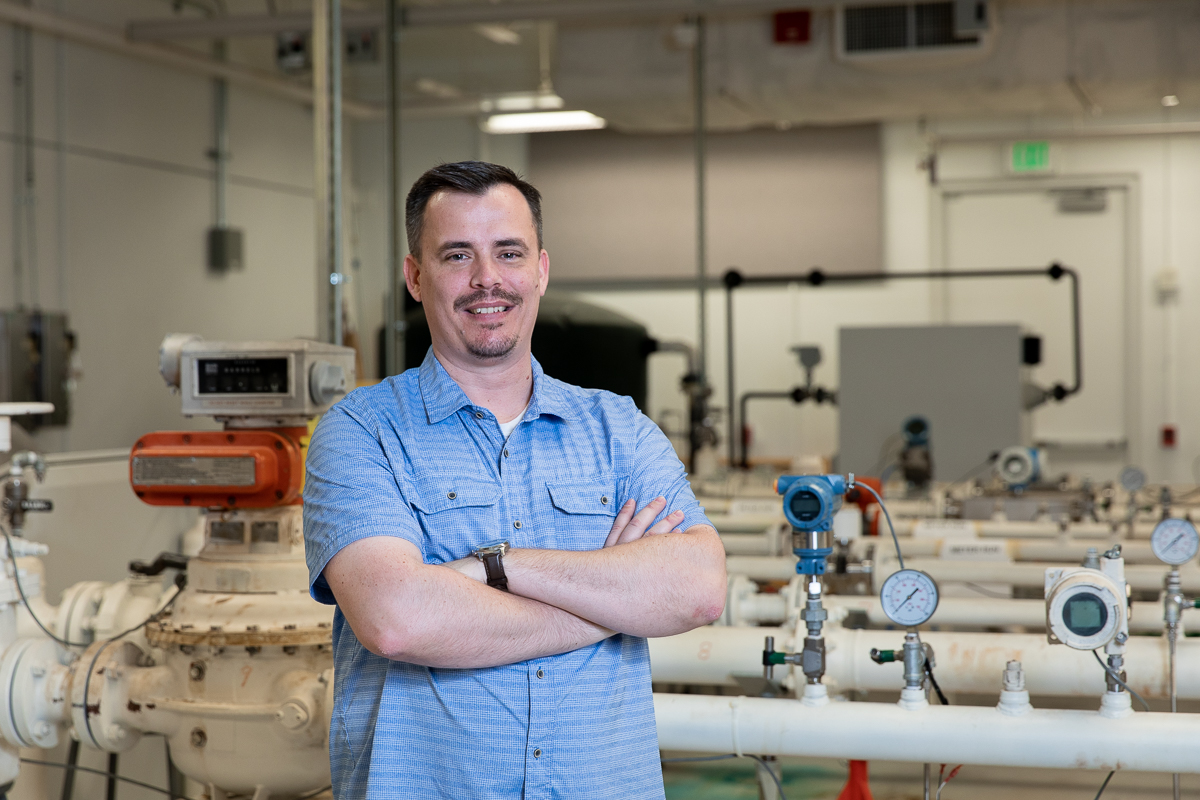 HOUSTON – Deep underground the greater Houston area is an intricate piping system transporting materials to sustain our energy lifestyle. To support that piping system above ground, Lone Star College-University Park is training students to safeguard the metal piping from one of its biggest threats: corrosion.
HOUSTON – Deep underground the greater Houston area is an intricate piping system transporting materials to sustain our energy lifestyle. To support that piping system above ground, Lone Star College-University Park is training students to safeguard the metal piping from one of its biggest threats: corrosion.
“Corrosion control ensures that anything made of metal or that has metal in it is solid, safe and secure,” said Steven Kahla, dean of business, applied sciences, computing and engineering technologies at LSC-University Park. “That could be a pipe moving natural gas or petro products, holding tanks, or metal on a bridge.”
Students at LSC-University Park learn corrosion control and integrity management through an Associate of Applied Science (AAS) degree in Corrosion Technology. The two-year program utilizes chemistry, electricity, physics, metallurgy and other sciences to prevent or control the chemical and mechanical aspects involved in the deterioration process.
“Corrosion technicians solve the issue before it becomes a problem and call it to the attention of others so that it can be fully fixed,” explained Kahla.
John Richardson is one of the college’s first corrosion technology students. After experiencing the ups and downs as a project manager for a variety of pipeline companies, the 38-year-old returned to school to seek a steady career path.
He chose corrosion technology specifically after watching his brother successfully complete a similar program and become certified by NACE, the National Association of Corrosion Engineers. LSC-University Park’s degree program prepares its students for three different types of NACE certification, including Level 1 certifications for Coatings Inspector, Internal Corrosion Technologist, and Pipeline Corrosion Integrity Management (PCIM) Technician.
“There are very few career paths where you can earn a degree in two years and come out making $60,000 or more,” said Richardson, who’s halfway through the program. “My brother and I were going through some of the same things [with our careers]. I got him thinking about becoming a pipe inspector, and he really took it to the next level to get certified. He did really well and pushed me toward it, so here I am.”
The college recently developed the program by tapping into a strong partnership with industry professionals from leading energy companies, many of which surround the LSC-University Park campus off TX-249 in northwest Houston. A 15-member advisory committee comprised of professionals from NACE and companies such as Kinder Morgan, ConocoPhillips, Acuren, Coastal Corrosion Controls, and Enercon provided input on the program and clarified important skills necessary for those coming out of college and into the field.
“There were so many companies that came to us and said, ‘we need a program for corrosion technology,’” said Kahla. “At that time, the nearest program for corrosion technology was in Kilgore, some three hours away. I am most proud about the industry involvement; our partnership with these companies enhanced every aspect of the program and allowed us to create a degree plan that seamlessly transitions into the workforce.”
“Structuring degree programs that precisely fit the specific needs of industry while providing students a pathway to gainful employment is the epitome of our college’s mission,” said Dr. Shah Ardalan, president of LSC-University Park. “Corrosion technology is a unique, innovative career path, and we’re proud to be a leader in providing students access to learning the knowledge and skills for success in this field.”
While portions of the program are offered via online coursework, certain classes utilize the campus’ state-of-the-art Corrosion Lab, which was created under the direction of the advisory committee. Students get hands-on experience with atmospheric controls, cathodic controls, and coating and inspection tools.
“For the lab, the advisory committee basically modified our own tool list for things that would be applicable to the students,” said Drew Hevle, manager of corrosion control at Kinder Morgan and member of the program’s advisory committee. “This gives them exposure to the tools they will use on the job.Corrosion affects every industry, and the tools we use here are pretty universal to other industries, too.”
As a very hands-on field, corrosion technology is geared for someone who wants to be outside and is mechanically inclined. A typical day is spent inspecting a project, using metering equipment in the field, or prepping a pipe for corrosion protection based on where it will be placed or how it will be used.
“Corrosion prevention is a big industry that has a huge impact across all industries,” said Hevle. “Houston is very oil and gas focused, but think of other industries in other parts of the country, like the airlines for instance.”
After obtaining a degree in corrosion technology from LSC-University Park, students like Richardson are extremely marketable in pipeline and other industries and can enter the workforce almost immediately.
“Corrosion technology is a need everywhere across the world, not just here in Houston,” said Richardson. “But my family is here, so I hope to get a job in Houston and stay close.”
Graduates of the AAS in Corrosion Technology program are also eligible to pursue one of the new bachelor’s degrees that Lone Star College began offering in 2020 - the Bachelor of Applied Science in Energy, Manufacturing and Trade Management (BAS-EMTM) program. The BAS-EMTM is designed for students seeking to further develop their professional qualifications and a greater understanding of the managerial roles in energy, manufacturing and trades industries.
For more information on the corrosion technology program at LSC-University Park, please visit bit.ly/LSCUP-CorrosionTech.
For information on taking classes at LSC-University Park, visit LoneStar.edu/StartUP or call 281.290.2600. Registration for the second summer session and the fall semester is ongoing and classes are filling quickly.
LSC-University Park provides steady career path safeguarding pipelines
Published on: June 30, 2021
